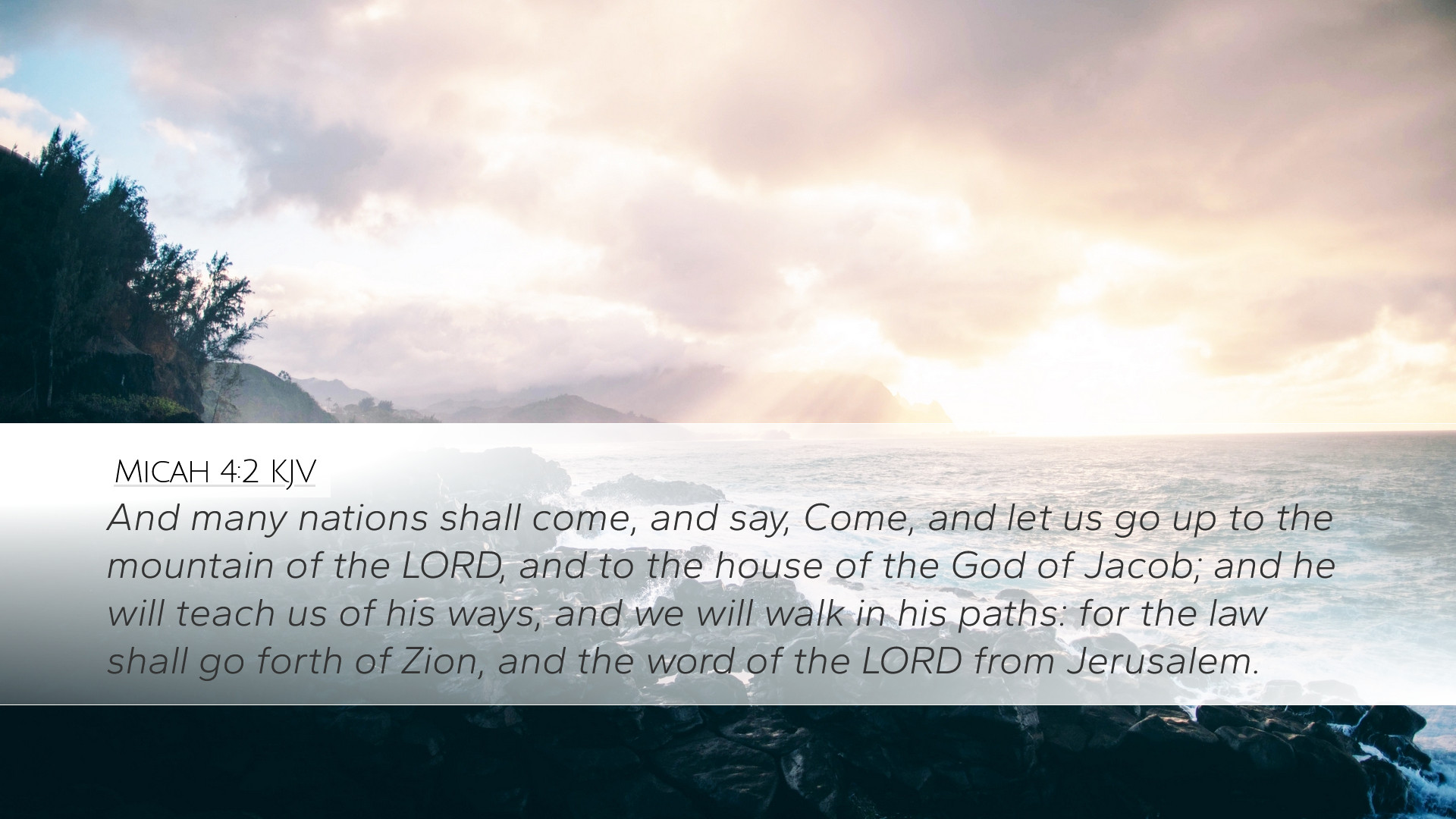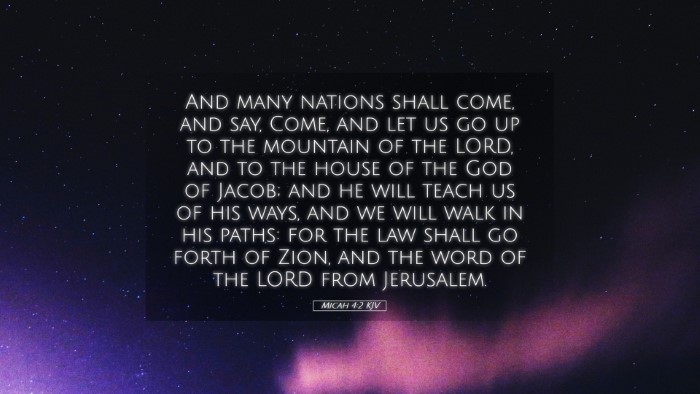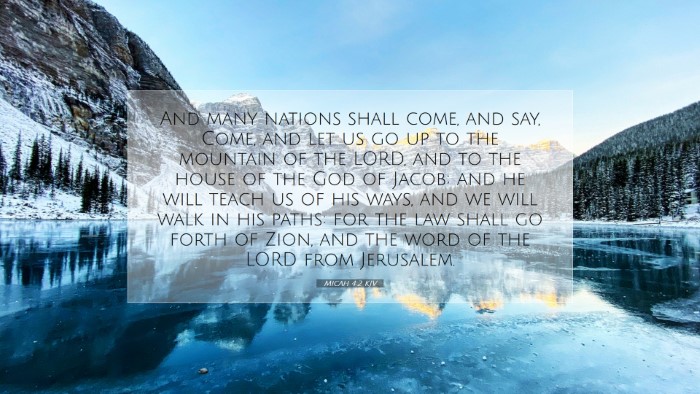Old Testament
Genesis Exodus Leviticus Numbers Deuteronomy Joshua Judges Ruth 1 Samuel 2 Samuel 1 Kings 2 Kings 1 Chronicles 2 Chronicles Ezra Nehemiah Esther Job Psalms Proverbs Ecclesiastes Song of Solomon Isaiah Jeremiah Lamentations Ezekiel Daniel Hosea Joel Amos Obadiah Jonah Micah Nahum Habakkuk Zephaniah Haggai Zechariah MalachiMicah 4:2
Micah 4:2 KJV
And many nations shall come, and say, Come, and let us go up to the mountain of the LORD, and to the house of the God of Jacob; and he will teach us of his ways, and we will walk in his paths: for the law shall go forth of Zion, and the word of the LORD from Jerusalem.
Micah 4:2 Bible Commentary
Commentary on Micah 4:2
Micah 4:2 states: "And many nations shall come, and say, Come, and let us go up to the mountain of the Lord, and to the house of the God of Jacob; and he will teach us of his ways, and we will walk in his paths: for the law shall go forth of Zion, and the word of the Lord from Jerusalem."
This verse is rich in theological implications and prophetic vision. It embodies a universal call to worship and a promise of divine instruction, ultimately revealing the nature of God's purpose and the future hope for humanity. The insights from notable public domain commentaries offer valuable perspectives on its interpretation.
General Overview
The context of Micah 4:2 is primarily rooted in the prophetic literature of the Old Testament, where Micah addresses both the present conditions of Israel and the future hope of restoration. This particular verse emphasizes God's future reign, where nations will seek the Lord and His teachings.
The Nations' Involvement
Micah begins with the concept of "many nations." This is a significant theme, as it indicates a shift from Israel being the sole focus to a broader, more inclusive vision of God's salvific plan.
- Matthew Henry notes that this reflects the engagement of the Gentiles with the God of Israel, underscoring the universal scope of God's redemptive work.
- Albert Barnes highlights that the nations' coming signifies the acknowledgment of the Lord's sovereignty and the desire for His guidance amidst human uncertainty.
- Adam Clarke emphasizes that this invitation to worship at the mountain of the Lord is an allusion to the future global acknowledgment of God’s authority.
The Mountain of the Lord
The "mountain of the Lord" is a metaphor for a place of divine presence and instruction. Traditionally identified with Mount Zion, this imagery represents spiritual elevation and the place where God communes with His people.
- Matthew Henry elaborates that God’s mountain indicates a place where believers find refuge and strength, echoing Psalms 125:1.
- Albert Barnes adds that the advent of the nations to this mountain symbolizes the call to collective faith and worship in unity.
- Adam Clarke suggests that the ‘mountain’ refers to both a literal and spiritual ascension toward God, where believers come to learn and receive His word.
Divine Teaching and Walking in His Paths
In the second part of the verse, the invitation extends to learning God's ways and walking in His paths, indicating the transformative relationship expected between God and humanity.
- Matthew Henry emphasizes the necessity of divine teaching for correct living, signifying that the way of the Lord is superior to human wisdom.
- Albert Barnes points out that this pursuit of learning signifies a deep longing for spiritual growth and moral instruction rooted in God’s law.
- Adam Clarke remarks that the response to divine instruction is active; it requires believers to embody their faith through their actions.
The Law from Zion
The concluding phrase of the verse, "for the law shall go forth of Zion, and the word of the Lord from Jerusalem," emphasizes the centrality of God's law and revelation as crucial for spiritual life.
- Matthew Henry suggests that this law symbolizes the moral and ethical standards that guide believers’ actions, emanating from a holy place.
- Albert Barnes interprets this as a prophetic assurance that God's revelation will originate from Zion, thus highlighting its significance as the center of worship.
- Adam Clarke discusses the fulfillment of this prophecy in Christ, who is recognized as the ultimate source of divine instruction and law.
The Eschatological Implication
Micah 4:2 can be considered eschatological, pointing toward a time when all nations will recognize God's sovereignty and the universal nature of His teachings.
- Matthew Henry articulates that this vision assures believers of a future dispensation where peace prevails, and God's truth is universally acknowledged.
- Albert Barnes emphasizes that this prophecy encourages faith amidst current adversities, reflecting a hope for the final restoration of God’s people.
- Adam Clarke discusses how the realization of such unity and peace among nations can only occur through the transformative power of God’s word.
Conclusion
Micah 4:2 serves as a powerful affirmation of God's inclusive call to worship and teaching, transcending geographical and cultural boundaries. The combined insights of the commentaries underscore the significance of divine instruction in a believer's life and the hope that believers can find in the promise of a future where God's reign is recognized and celebrated by all nations.
This verse encourages pastors, students, theologians, and Bible scholars to reflect on the implications of God’s law in their teaching, the importance of faith demonstrated through action, and the inclusive nature of God's kingdom.


